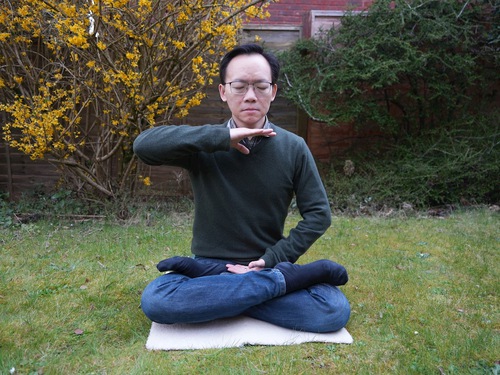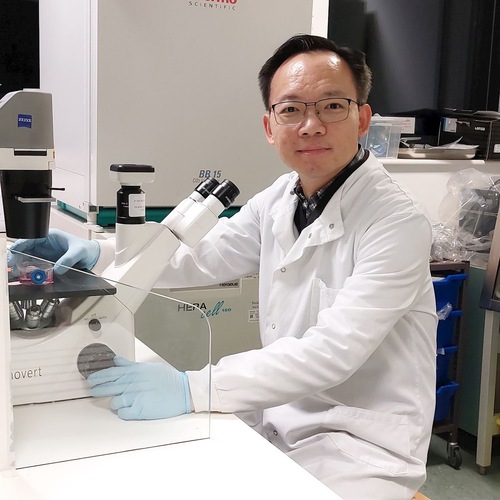A Young Scientist’s Life and Research Has Benefited from Falun Gong
(Minghui.org) Cardiff University is a prestigious university located in the capital of Wales. It is one of the best and largest academic institutions in the UK. It is renowned for its excellence in research as a member of the nation’s elite Russell Group and ranks within the nation’s top 10 for neuroscience research.
Dr. Greg Wu is a scientist at Cardiff University from the island of Borneo in Malaysia. He grew up in a small town with a population of only 5,000. He never imagined that he would encounter the book of Falun Dafa, Zhuan Falun in a foreign country and that it’d change his life.
An Idyllic Childhood
Dr. Wu grew up in a typical Chinese Malaysian family who was hardworking, and practical people descended from Chinese immigrants. His father ran a small eatery in town, while his mother was a homemaker. He had three older sisters.
On the island, life was carefree for Wu. He spent much of his free time running around and playing badminton, exploring the world through childish curiosity. And through his child’s eyes, Wu saw a town around him that lived modest, uncomplicated lives based on a few traditional values.
“In Malaysia, people would go to temples to pray for their families and things like that,” recalled Wu. “Growing up, I also went to the temple with my parents.”
While his family did present offerings to deities like most other Malaysian families did, Wu never got an in-depth understanding of who or what the offerings were for, or why they had to pay respects and pray. However, he said, “At that time, I did believe that there was some kind of higher power.”
Academically Successful, But Less Happy in Life
As he grew older, he began to spend more time in the reading room learning many things. The topic that piqued his interest most was genetics.
“I read a lot of popular science books, and it just made me become more and more interested in science. It was around [the mid-nineties], when they were about to publish the Human Genome Project, which is very inspiring. I read a lot of stories about that,” said Wu. “There was also the cloning of Dolly, the sheep, another big story.”
A few years later, after graduating from high school with honors, he traveled overseas to the University of Nottingham in the UK to continue his studies.
In England, Wu furthered his studies with great success. His assiduous nature and success in research caught the attention of his undergraduate advisors, who were more than happy to put in a good word for him. He graduated from the University of Nottingham with a bachelor’s degree in genetics and a full ride to Oxford University’s Ph.D. program.
By then it was 2003, and the Human Genome Project had finally been completed, giving scientists a comprehensive mapping of human DNA. This opened the door to gene therapies in medicine, and Wu’s doctoral thesis, “How Cancer-Suppressing Genes Maintain Genomic Stability,” was an exploration in that very direction.
Yet, the closer he came to his dream, the less he could feel the spark of energy that first spurred him into action all those years ago. His noble aspirations of changing the world eroded away into the daily grind of experimentation, paperwork, competition, and politicking—and part of him eroded with it.
“Back then, I really followed a ‘survival of the fittest’ mindset,” said Wu. “I always had to be number one. I was always afraid of people being better than I was. If I saw other people get better marks or better results than me, I’d feel jealous, like life wasn’t fair.”
This mindset made Wu view his peers as enemies. He was constantly suspicious, on guard, and afraid that the success of his peers would somehow damage his own outcomes. He always worried that other people would take the results of his experiments as their own. “I felt that life was tiring,” he said. “I felt unhappy.”
“I did wonder about religions and why some of my friends are very religious,” he said. “I didn’t quite understand why people would believe in something like that.”
“And I guess I was also kind of arrogant. A lot of scientists don’t want to believe in a higher power, and that made me a bit reluctant to go any further into religion.”
Unfortunately, a lack of attention was not nearly enough to make the problems go away. Though the stress of his lifestyle had already taken its toll on his mind, it soon began to manifest in his body as well; he developed chronic digestion issues that caused his abdomen to regularly bloat and ache.
A Newspaper and a Book Change His Life
When he saw a free Chinese-language newspaper at the public library in Oxford one day, he was immediately drawn to the familiar language in an unfamiliar land. From that day on, he became a loyal reader of The Epoch Times.
After the Chinese Communist Party (CCP) began its campaign to eradicate the spiritual practice from China in 1999, it simultaneously launched a global propaganda push that sought to demonize the practice and legitimize its brutality against Falun Gong practitioners.
The Epoch Times brought the facts of the persecution to light, detailing the egregious human rights violations committed against law-abiding Chinese people and the CCP’s trampling of religious freedom. In addition to this, it also covered countless cases of how people achieved better physical health and improved their character through practice.
By 2004, Wu’s digestive problems were bad enough that he decided to give the practice a shot. In November of that year, he began to cultivate in earnest.
“I printed out Zhuan Falun at my university, and then I read it,” said Wu. “That’s how I got started in cultivation.”
Wu finished reading the three hundred pages of Zhuan Falun in two days. Although Master Li Hongzhi, the author, and Falun Gong’s founder, intentionally used simple language in the book, Wu found the concepts conveyed exceptionally profound—and also reminiscent of the ideas he knew from the scientific field.
“I found it striking that Master Li explained cultivation in scientific terms, which made it easier to understand,” said Wu. “He used modern science and the science of the human body to explain arcane concepts. When I read it, I just changed.”
“For example, Master said that virtue and karma are in physical form. They exist in the human body in another dimension and talked about the relationship between virtue and karma transformation. Also, Master explained the changes in the human body during qigong practice from a scientific perspective, and the nature of life is kind.”
It was like a light had gone on in Wu’s mind, connecting the two sides of his world (material and spiritual) that he once thought were complete opposites. But above all, he felt a strong intuition, something in his gut that told him he had found what he was looking for.
“I don’t think I can explain it, really,” he said. “I just believed it, basically. It just clicked.”
After finishing Zhuan Falun, Wu looked up instructional videos on the Internet and taught himself the five sets of Falun Gong exercises. He also found some of Master Li’s later writings after Zhuan Falun, which he read voraciously until he happened upon some concepts he didn’t quite understand. This led him to reach out to the local community of Falun Gong practitioners at the University of Oxford.
 Dr. Wu practicing the Falun Gong sitting meditation.
Dr. Wu practicing the Falun Gong sitting meditation.
“I remember the first time I went to the exercise site,” recalled Wu. “I managed to do the sitting meditation with the full lotus position for half an hour. The other practitioners were quite amazed.”
That happened in January 2005. Up until Wu left Oxford with his doctorate in 2007, he would study the teachings and do the exercises of Falun Gong with this group of practitioners every week, finding new perspectives on life along the way.
Young Scientist Becomes More Successful After Practicing Falun Gong
“For a geneticist, the fundamental unit of life is genes in our DNA,” said Wu, “but it was interesting that Master Li revealed that there was something more fundamental and microscopic that affects lives, things like karma and virtue.”
“My worldview just changed completely,” said Wu. “I went from a selfish person who likes to fight for personal gain to a more selfless and compassionate way of existence.”
Interestingly enough, Dr. Wu said his research yielded better results when he became more altruistic. In 2023, he was even awarded a prestigious research fellowship totaling nearly two million pounds to study the genomic stability of neurological disorders.
The cagey young man who used to be paranoid about his fellow researchers was now being considerate of his peers, always checking to see if his experiments would interfere with other people’s work before he began them. He’d also help create reagents for the other researchers in his lab when they ran out.
“I now always try to think of others first at home or at work, so I have good relationships with family members and my work colleagues,” he said. Soon after he started practicing Falun Gong, the digestive problems that bothered him so badly vanished.
Wu said that now he is living a happier and healthier life.
Dr. Wu started a Friends of Falun Gong club at Oxford University. He also volunteers his time to raise awareness of the practice’s persecution in China.
“It is the most wonderful practice. I have benefited a lot from learning Falun Gong, both physically and mentally,” said Wu.
And for anyone who’s curious about Falun Gong, Wu has the following advice: “Don’t be affected by what the CCP says about Falun Gong. Come to experience it yourself, and it will be the best decision you have ever made.”
Background: What Is Falun Dafa and Why is the CCP persecuting it?
Falun Dafa (also known as Falun Gong) was first introduced to the public by Mr. Li Hongzhi in Changchun, China, in 1992. The spiritual discipline is now practiced in over 100 countries and regions worldwide. Millions of people who have embraced the teachings, which are based on the principles of Truthfulness, Compassion, and Forbearance, and have learned the five exercises, experienced improved health and well-being.
Jiang Zemin, former head of the Chinese Communist Party (CCP), perceived the spiritual discipline’s growing popularity as a threat to the CCP’s atheistic ideology, and on July 20, 1999, he issued an order to eradicate the practice.
Under Jiang’s personal direction, the CCP established the 610 Office, an extralegal security organization with the power to override the police and judicial systems and whose sole function is to carry out the persecution of Falun Dafa.
Minghui.org has confirmed the deaths of thousands of practitioners as a result of the persecution over the past 24 years. The actual number is believed to be much higher. Countless practitioners have been imprisoned and tortured for their faith.
There is concrete evidence that the CCP sanctions the harvesting of organs from detained practitioners, who are murdered to supply China’s organ transplant industry.
